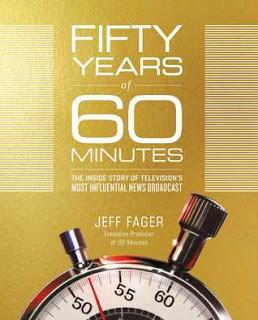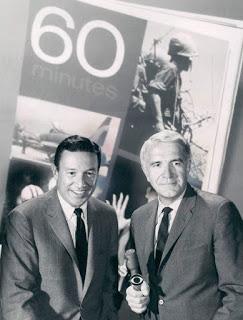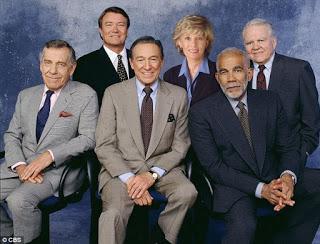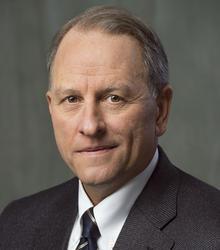
ABOUT THE BOOK:
The ultimate inside story of 60 Minutes, the program that has tracked and shaped the biggest moments in post-war American history.
From its almost accidental birth in 1968, 60 Minutes has set the standard for broadcast journalism, joining us in our living rooms each Sunday night to surprise us about the world. The show has profiled every major leader, artist, and movement of the past five decades, perfecting the news-making interview and inventing the groundbreaking TV expose. From legendary sit-downs with Richard Nixon in 1968 (in which he promised “to restore respect to the presidency”) and Bill Clinton in 1992 (after the first revelations of infidelity) to landmark investigations into the tobacco industry, Lance Armstrong’s doping, and the torture of prisoners in Abu-Ghraib, the broadcast has not just reported on our world but changed it too.
Now, Executive Producer Jeff Fager pulls back the curtain on how this remarkable journalism is done, taking the reader into the editing room with the show’s brilliant producers and beloved correspondents, including hard-charging Mike Wallace, writer’s-writer Morley Safer, soft-but-tough Ed Bradley, relentless Lesley Stahl, ace interviewer Charlie Rose, tireless Anderson Cooper, intrepid Scott Pelley, and illuminating storyteller Steve Kroft. He details the decades of human drama that have made the show’s success possible: the ferocious (and encouraged) competition between correspondents, the door slamming, the risk-taking, and the pranks. Fager takes on the program’s mistakes and describes what it learned from them. Above all, he reveals the essential tenets that have never changed: why founder Don Hewitt believed “hearing” a story is more important than seeing it, why the “small picture” is the best way to illuminate a larger one, and why the most memorable stories are almost always those with a human being at the center.
At once a sweeping portrait of fifty years of American cultural history and an intimate look at how the news gets made, Fifty Years of 60 Minutes shares the secret of what’s made the nation’s favorite TV program exceptional for all these years.
LISTEN TO AN EXCERPT:
MY REVIEW:
 Fifty Years of 60 Minutes: The Inside Story of Television’s Most Influential News Broadcast by Jeff Fager
Fifty Years of 60 Minutes: The Inside Story of Television’s Most Influential News Broadcast by Jeff FagerMy rating: 4 of 5 stars
Fifty Years of 60 Minutes: The Inside Story of Television's Most Influential News Broadcast by Jeff Fager is a 2017 Simon & Schuster publication.
Informative, interesting and nostalgic.
60 Minutes first aired in 1968, and incredibly, is still broadcast today. So, what is the secret to its longevity?

The journalists have been top notch from the beginning to present day. The stories are controversial, hard hitting, have exposed scams and enormous scandals, but also made room for satire, humor, and fluff pieces as well as featuring interviews with the most popular celebrities of the day.
It was perhaps the first news magazine format on television and it inspired many other similar news programs and talk show formats over the years.
But, the show got a huge boost when it was moved to Sunday nights, which gave them a huge lead in audience from NFL football. The prime spot was a ratings boon for the show, and from there the influence upon viewers was unprecedented.
This book is separated by decades- beginning with 1988- 1998- the third decade-
But, then goes back to the beginning- 1968- 1978- highlighting the best stories, the ‘behind the scene’s environment at the time, and plenty of revealing conversations, accompanied by an abundance of photographs.
One of my favorite stories involved Steve Kroft’s piece on a Houston used car wholesaler, Bill Whitlow, known as the ‘mile buster’, because he rolled back odometers, also known as ‘busting miles’, before selling cars to dealers at higher cost.
Uncovering the scam, led to one of the best punchlines in the history of the show:
KROFT: I want to show you one thing.
WHITLOW: All right.
KROFT: You know what’s back there?
WHITLOW: No.
KROFT: It’s a TV camera back there.
WHITLOW: Oh, is it?
KROFT: Yeah. Yeah, we’ve been taping this whole thing.
WHITLOW: Well, all right.
KROFT: The good news is we’re not cops.
WHITLOW: Well, I didn’t think so.
KROFT: The bad news is we’re 60 minutes.
(Whitlow was sentenced to six years in prison and blamed Steve)
Naturally, many people have automatically felt 60 Minutes to be synonymous with the tobacco story, which was much harder to get on the air than any other story and took its toll on everyone, including CBS and the entire staff on 60 minutes. It’s a fascinating piece and is one of the most memorable stories in the show’s fifty - year history.
The show was also known for its celebrity interviews which included such big names a Clint Eastwood, Tina Turner, and Beyonce, but there were also interviews with presidents, as well as many other world leaders.

The show has seen many personnel changes, experienced tragedies, and untimely deaths over the years, and has struggled with ratings, especially after they lost the coveted football lead in, but has managed to stay on the air and remains relevant.
From a personal standpoint, I remember my parents watching this program, and while it may not seem like the type of show a young person might find interesting, I often found myself very absorbed in the stories. I was always very interested in the medical and scientific breakthrough segments and of course, I enjoyed the celebrity interviews, too.
I must confess, though, that I never was a loyal viewer as an adult. I tuned in on occasion, sometimes watching it regularly, but often going years without seeing a single episode. But, even if you didn’t watch the show consistently, the segments often made headlines, and now with the ability to stream the programs from the CBS website or to watch clips on YouTube, the program can be watched at any time, the show reaches a younger audience as well as a wider range of viewership, keeping the stories at the forefront of our minds.
This book is just a little over four hundred pages, so with fifty years of material to cover, you know the author, who is the executive producer of the show, really does touch on the major highlights, the influential journalists and the most intense and fond relationships and memories. I do think that’s maybe a good thing in an age where our attention spans are not as long, but it also skimmed over an enormous amount of terrific material.
As mentioned, the photos are plentiful, both black and white and color, and is a very nice touch, as it puts names with faces in many cases.
I really enjoyed looking back on the show’s history, reliving the politics in front of the camera, but often the politics behind the camera was just as interesting, if not more.
There are many memories, great stories, some embarrassing moments, and some surprising revelations in this book. I think fans of the show will want to check this book out and even if you are only a casual fan or viewer, this book will remind you of how and why it has managed to survive all these years in such a ruthless market and perhaps renew your interest in the show.
Overall, this book is well organized, fascinating and fun to read.

GET YOUR COPY HERE:
https://www.amazon.com/Fifty-Years-Minutes-Televisions-Influential-ebook/dp/B01MPZDFM3/
https://www.barnesandnoble.com/w/fifty-years-of-60-minutes-jeff-fager/1125092993
ABOUT THE AUTHOR:

Fager began his career in broadcast news in Boston and joined CBS News, KPIX-TV, where he was a broadcast producer.Fager then became an Executive Producer of The CBS Evening News and held senior and field producer positions for that broadcast and other CBSNew entities, including 60 Minutes. In June 2004, he assumed the position of Executive Producer of 60 Minutes.[4]In February 2011, it was announced that Jeff Fager would lead the news division of CBS as Chairman of CBS News, a newly created position. In tandem with the newly appointed president David Rhodes, Fager would head CBS News while continuing to executive produce 60 Minutes.[5]Since stepping in as Chairman of CBS News, Fager has vowed to "restore CBS News to where it should be, where it needs to be," using the original reporting and storytelling of 60 Minutes as a benchmark for its other flagship news programs.[6]On January 1, 2015, Fager stepped down as Chairman but continued in his executive producer role. David Rhodes continues to serve as President of the CBS News Division.

